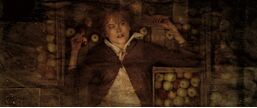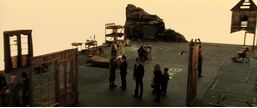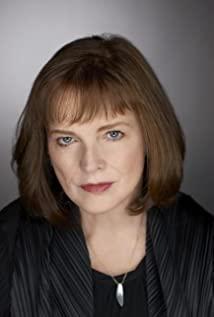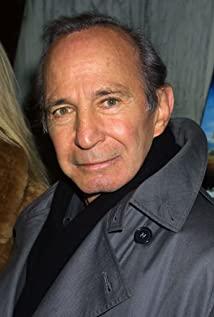Grace actually thinks that remote places are more human, which is really the fantasy of urban youth. Human nature is formed through interpersonal interactions. Gou Town is so remote that it hardly has any contact with the outside world. Even the police come and leave, and there is not even a foreign priest. They are all locals who have lived there for many years. Can you count on their self-discipline? What's more, how can there be a high moral standard in a place where material resources are scarce? This kind of fantasy of the Peach Blossom Land always reappears with a different face every once in a while, and this mask should be pierced.
Everyone in this film is quite normal, although the end is unexpectedly cold. But the most abnormal is Grace.
For the first two and a half hours, Grace thought it was a woman who married into the mountain, but in the last half hour it went downhill. Mistress, are you kidding me, with such a powerful father who would rather stay in Dogtown as a public servant and a prostitute just because of a quarrel? Even though she thought his father wanted to kill her, when his father explained that he was too angry at the time and hoped that she would go back with him, she still said that the people of Dogtown had no moral problems and should be sympathized with instead of punished. To be insulted, deceived, and reprimanded, it was like a breeze to her, and it was like it didn't exist in the past. Just got raped, buttoned up and said to others, sorry, I'll work right away, this is what the Virgin can do, right? Such a Virgin really only exists in the script. No wonder there is a folk tale that Guanyin turned into a prostitute to save all sentient beings. The only ones who can do this and can forgive are probably the Virgin Mary and the Bodhisattva.
How are the villagers divided? It was Chuck first, who raped her while the police were outside. The police came because of the bank robbery that she was framed, and she couldn't fall into the hands of the police, so she hid and didn't call for help. But after that, she should try to get out of here. Because at the beginning of the meeting, she was right that everyone had to agree to her to stay. Anyone who reported her to the police would go to jail. So she couldn't resist Chuck, so she had to leave. Because if anyone finds out that it's a big disruption to relationships, she'll have a hard time getting her feet on the ground. And nothing can remain a secret forever.
Then there's Chuck and Weiss' youngest son. Even the child knew her handle and demanded to satisfy his masochistic desire. After the incident came to light, she lost the friendship of the women in the town. It goes without saying whose side the women are on.
I've always felt that women are actually excusable. Who can accept a babysitter abusing their own child? When the child says he has been abused, does a mother believe outsiders or her own child? You shouldn't be doing this job if you can't deal with the little threat of a child. A woman who abuses her children has almost since been considered uncommon to do anything.
At this point, she lost her footing. The acceptance of the women of the town is crucial. The initial acceptance of women is also extremely important. Tom actually didn't play a role. He was the most typical literati. In fact, it was a bad idea to go to various households to help maids in the first place. It is not a good thing for a beautiful woman to dangle in front of a group of farmers, workers, and widowers.
Then there is the sighting and Chuck's affair. Weiss' reaction was reasonable. A woman with seven children, will she trust her husband or another woman? Not to mention that Grace actually didn't explain it at all. Of course, I believe it is useless to explain, women want to believe in their husbands. But seeing the ending, knowing that her refusal to explain is out of arrogant pity, I feel like she deserves it. Because if she explained, she might now be kicked out of Dogtown by Weiss, who refused to believe, but at least it's not that much.
She still hadn't left. I don't know what she thinks, even if she is afraid of her father's pursuit, any other place is much better than here.
Then everyone became less friendly. She was finally ready to leave, and Tom had another useless idea. Can't you just go right away? She just walked right in. The stolen money was discovered, and Tom pushed directly on her. So things got to the worst.
At this time she was still close and dependent on Tom. I thought it was someone close to breaking down looking for the last tender solace, but for the last half hour her father pointed out that she was just so condescending and arrogant that no one would not be forgiven, and I orz.
The most unforgivable person in the film is Tom. Grace's mistrust of him is also excusable. After all, he was so considerate and understanding in the beginning, and he was always trying to find a way for her. Although he didn't make any effort, and none of the ideas he came up with were good. However, Grace still couldn't see the true face of the first friendly person she met in this town.
But the residents of Dogtown had already seen through Tom. They said he was lazy, had nothing to do every day, and always taught people a lesson. They patiently went to church and listened to his nonsense probably just because there was no pastor and people needed a reason to meet. It's strange that Grace has been in town for so long without finding out what others say about Tom.
The so-called truth-telling gatherings will not succeed if you think with your toes. It is better to threaten privately with different people. Grace also expected it, but she was immersed in her high sense of morality and pity. Out of her reliance and trust in Tom, she didn't use her brain and didn't insist on opposing it. This idea also fully exposed Tom's assumptions, unreliability and irresponsibility.
Of course, Tom's most wonderful transformation was when he failed to get pleasure and betrayed Grace, and when Grace revealed his weakness, that he was not that moral, but just said something nice, he became angry, which fully exposed him. nature.
If you want to betray Grace, why not call the police but the underworld boss? Because Tom still wants to make a profit out of it.
When the convoy was about to arrive, Tom even proposed to lock up Grace so that the other party could see how badly they treated Grace, which really exposed the face of the literati. super born.
If you want to say that the most successful character created in this film is little Tom Edison.
PS: When I saw the men in the whole town in the second half of the town came to Grace to have fun, I felt pity for this woman, and at the same time I felt that she was indeed like some women in the dog town. Down to disturb and destroy this town. At least the people in this town lived a boring but well-organized life before she came, but she was so innocent.
View more about Dogville reviews











